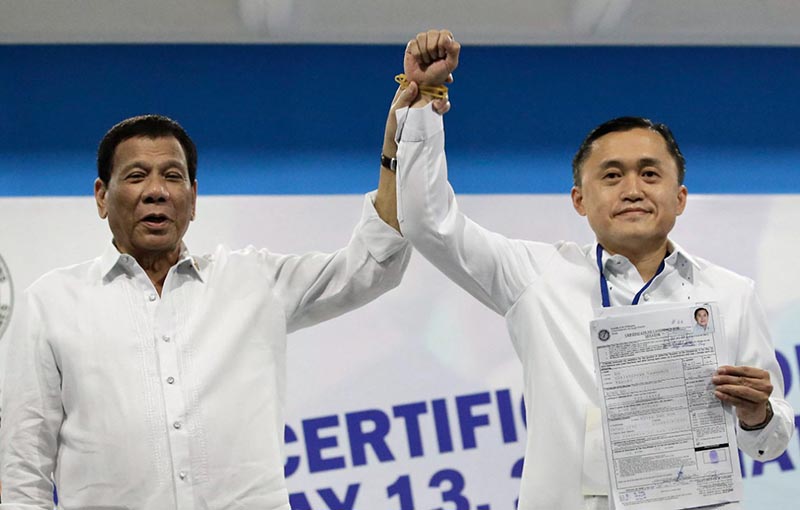[Analytics] Midterm massacre hands Duterte all the power in Philippines

Philippine President Rodrigo Duterte (L) raises the arm of his executive assistant Bong Go, after filing his senatorial candidacy, Manila, October 15, 2018. Photo: Presidential Palace
Philippine leader’s political allies swept May 13 midterm elections, paving the way for constitutional change and fewer democratic checks on his controversial rule. Richard Javad Heydarian specially for the Asia Times.
President Rodrigo Duterte’s allies swept May 13 midterm elections in the Philippines, a result with potential seismic implications for the country’s politics and future as a democracy.
Most significantly, Duterte-aligned politicians swept the dozen seats up for grabs in the 24-member Senate, a body that has until now checked the president’s more controversial initiatives and policies.
The election gives Duterte near super-majority legislative support, which will likely allow him to overhaul the nation’s politics to a federal system through the introduction of a new constitution; clip institutional checks and balances on his presidency; and even potentially allow him to scrap presidential term limits to extend his tenure.
Despite technical glitches, including malfunctioning vote-counting machines and delays in the transmission of senatorial race results, the midterm elections were deemed broadly peaceful and credible by independent observers. Turnout was also relatively high, reaching close to 80%.
There were several upsets, especially in local elections. The biggest loser of the elections was the powerful Estrada clan. Former president Joseph Estrada suffered a massive loss in the mayoral race for Manila, while his son, Jingoy, and other relatives lost in Senate and local elections elsewhere, including in their bailiwick of San Juan city.
At the same time, local elections saw the rise of several new progressive and young leaders including Francisco “Isko Moreno” Domagoso, who beat former president Estrada, and Victor “Vico” Sotto, who ended the Eusebio dynasty’s decades-long grip on power in Pasig City, part of Metro Manila.
In what pundits have dubbed as the “Monday Night Massacre,” the liberal-left opposition pitted against Duterte’s camp suffered arguably its greatest defeat in a generation.
The president’s political allies are now set to dominate not only local government officers, including governors and mayors, but also the incoming 18th Congress.
The opposition Liberal Party (LP), a formidable ruling party just three years ago, managed to win just 14 out of 244 seats in the House of Representatives. Its greatest defeat, however, was in the crucial race for the Senate, traditionally a checking and balancing haven of independence and opposition to the ruling government.
Based on results with 96% of votes counted, the opposition apparently did not win even a single Senate seat. It’s two leading candidates, ex-presidential candidate Mar Roxas and re-electionist Benigno “Bam” Aquino IV, a relative of two former Filipino presidents, placed 16th and 14th, respectively.
None of the six other members of the so-called Otso Diretso (Straight Eight) opposition slate figured among the top 20 candidates for Senate seats. It represented the poorest opposition showing at midterm polls since the Ferdinand Marcos dictatorship (1965-86), experts noted.
While Duterte’s popularity was a factor, neither was history on their side. The opposition has managed to defeat the incumbent’s allies in the Senate on only three electoral occasions, namely in 1951, 1971, and 2017. In all three cases, however, they ran against an unpopular incumbent.
In contrast, Duterte’s approval ratings reached a historic-high of 81% ahead of the mid-term elections, local pollster Social Weather Stations showed in a May survey.
Two of Duterte’s core allies, former Special Assistant to the President Bong Go and ex-police chief Bato Dela Rosa, reflected that popularity, placing third and fifth respectively in the Senate race.
Neither of the two had ever held political office in the past. Running as Duterte’s alter egos, both Go and Dela Rosa are expected to serve as the president’s pivot of support in the Senate, including for crucial votes on constitutional change.
Other Duterte allies such as Imee Marcos (8th), the daughter of the former Filipino dictator, and Francis Tolentino (9th), Duterte’s political adviser, were also among the roster of Senate winners.
In total, administration allies are expected to secure at least nine out of the 12 seats, with the rest going to independents including former senators Grace Poe (2nd), Lito Lapid (7th) and Nancy Binay (12th).
It’s still possible that the number of successful administration bets rises to nine amid a still tight race between a Duterte ally and adversary for the final 12th seat, with three percent of the vote still to be counted.
This means that there will likely only be four opposition members, all elected in 2016, left in the forthcoming Senate, leaving Duterte’s allies and independents as the super-majority.
Analysts already expect former consigliere and Duterte right-hand man Bong Go to bludgeon the independents into toeing the administration’s line.
Dela Rosa, meanwhile, is expected to lead the charge in defending Duterte’s human rights record under the controversial war on drugs he oversaw as a former police chief.
The opposition has attacked the president on a bloody campaign that has won widespread criticism at home and abroad, including through a preliminary International Criminal Court investigation into possible crimes against humanity.
Duterte, the oldest president ever to be elected in the Philippines, is expected to quickly move on introducing a new constitution aimed nominally at devolving more power from the center to periphery.
Critics, however, believe that constitutional change will serve as cover for extending Duterte’s tenure, which will end in 2022 under a legal one-term, six-year limit, and removing institutional checks and balances on the executive office.
Elections held in May 2016 transformed the tough-talking former provincial mayor into a popular national leader. This year’s mid-term elections, however, appear to have put all the power in his hands, with few democratic checks left on his authoritarian designs and tendencies.